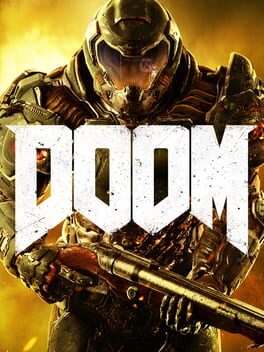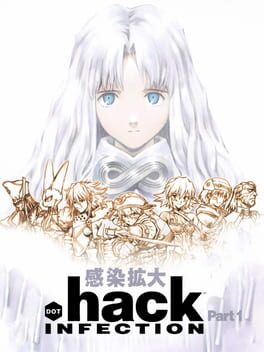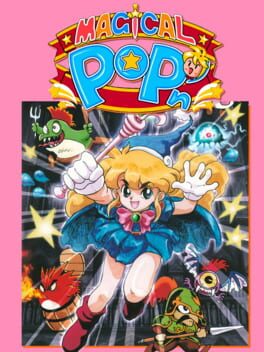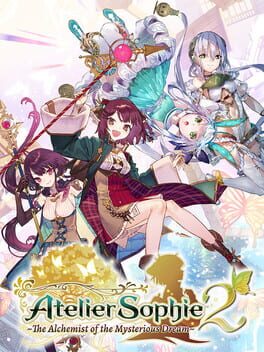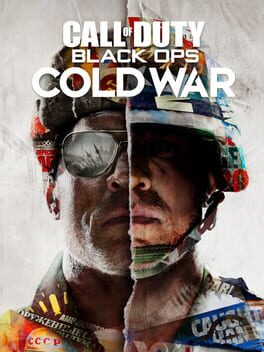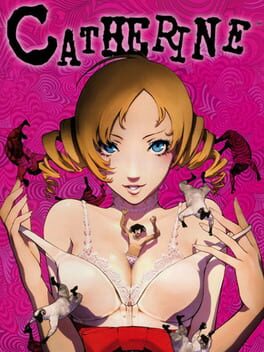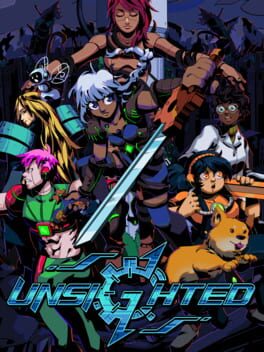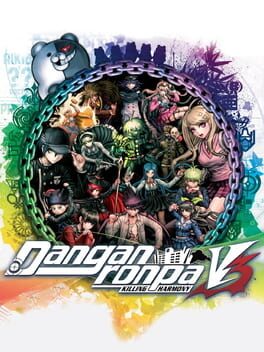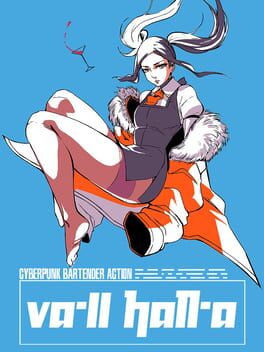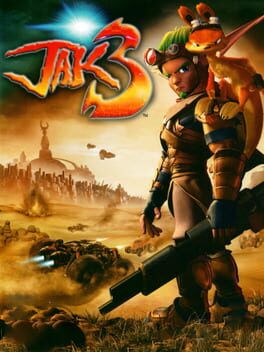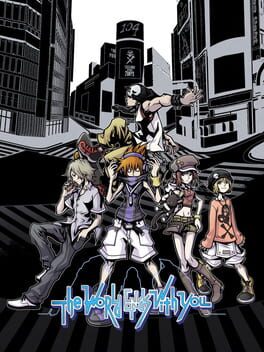zweiteturm
66 Reviews liked by zweiteturm
Persona 5 Royal
2019
This game is so fucking long, I'm almost 80 hours in and it feels like almost nothing of substance has occurred.
The plot is shallow as hell and half of the arcs feel like they exist to fill time between the start and the end of the game. The characters don't get developed after their introductory scenes. Even the social links feel less like watching character development occur and more like watching Joker singlehandedly save someone from their personal problems with his metaverse powers and silent protagonist charm. In a shorter game the style this game oozes would be enough to make up for how shallow it all is but after long enough the charm wears off and it just feels empty.
The combat isn't engaging to me. It's all pathetically easy, the game even goes as far as to give you multiple autopilot buttons, one that fast forwards with physical attacks and another that just picks the weakness targeting moves for you.
The plot is shallow as hell and half of the arcs feel like they exist to fill time between the start and the end of the game. The characters don't get developed after their introductory scenes. Even the social links feel less like watching character development occur and more like watching Joker singlehandedly save someone from their personal problems with his metaverse powers and silent protagonist charm. In a shorter game the style this game oozes would be enough to make up for how shallow it all is but after long enough the charm wears off and it just feels empty.
The combat isn't engaging to me. It's all pathetically easy, the game even goes as far as to give you multiple autopilot buttons, one that fast forwards with physical attacks and another that just picks the weakness targeting moves for you.
Persona 4 Golden
2012
Doom
2016
.Hack//Infection
2002
The true reveal of Metal Gear Solid 2 is not that we play as Raiden instead of Solid Snake - it's that the antagonist of the game does not exist. It's pulling back the curtain to find that the man behind it died a century ago. The most powerful nation on Earth is essentially an algorithm with a mind of its own, akin to a runaway train that everyone "in charge" pretends they are responsible for. There is no individual you get to blame. Not the politicians, not the CEOs of major corporations. Not even the current or former presidents of the United States have any idea of what's really going on. The algorithm will replace these people the second they stop being useful. In my opinion it's a much better conception of "the system" than what you see in most conspiracy fiction: a small, shadowy cabal of people pulling the strings from behind the scenes. The reality is that all of the powerful people we blame are just the ones who managed to latch on to the algorithm of capitalism and milk it for all they can. There is no grand design, nobody is in control, everyone responsible for setting this system into motion is long dead. Which is why Otacon says the Patriots "have been dead for 100 years".
Every choice you (and Raiden) make perpetuates this status quo, and every radical political cause (like Snake and Otacon's 'Philanthropy') is effortlessly co-opted by it. MGS2 conveys this idea in a way that only a video game could: By playing as Raiden, you are forced to directly confront the futility of any resistance. You can approach MGS2 in a million different ways with an expansive arsenal of tools, getting no kills or alerts and discovering every secret in the Big Shell, or do the exact opposite. But the end result is always the same: You kill Solidus, the only threat to the Patriots, after they explicitly tell you it's exactly what they want. If you opt out entirely and "turn the game console off" you're still doing something you were ordered to do. Even if you choose not to play, you lose to the Patriots. MGS2 places you in the position of the post-information age, digital subject: Imbued with detailed knowledge of every single way you are being oppressed and exploited, you still choose to follow orders. You are so overwhelmed by information, some true, some false, that is causes a kind of exasperated compliance.
This is simultaneously a commentary on the nature of video game stories as an immutable, pre-programmed series of events not as different from film narratives as we like to think; Any "choice" is always an illusion, whether it's in Metal Gear Solid or a Telltale game. Any game that sets out to fulfill the concept of "player freedom" in its story will always fail. Video games stories are (at their best) about interactivity, not choice. They let you play out a pre-ordained role and do some improvisation, not write the story. Kojima understands this, and it's why he borrows so much from film. It's also why the criticism that his games are too much like movies is kind of pointless; he's just recognizing the inherent similarities of the two mediums.
On a less meta level, this lack of free will in MGS2 underscores the reality that capitalism, American empire, the very norms and values of American society, whatever the antagonist of the game is - cannot be destroyed from within. It is a system that has achieved self-awareness. Any possible attempt to destroy it has already been anticipated with an infinite number of contingencies. Emma Emmerich gave her life to destroy the GW AI and it was just replaced with a backup. The battle has already been lost, and it was decided by a microscopic processor in a fraction of a second. Solidus (a perfect stand-in for the kind of right-wing populist we wouldn't see for awhile in 2001) was the only person in power trying to oppose the Patriots, but his fatal mistake was believing that the Patriots were essentially a deep state globalist cabal, rather than the nigh omnipresent force they really are (they aren't really a "they", but an "it"). Like Snake said, "the Patriots are a kind of ongoing fiction". But even the legendary Solid Snake, the archetypal hero who opposes the system with clear-eyed determination, is completely dumbfounded after the credits roll.
And that's because this enemy is simply beyond the abilities of one man, even if that man is a Snake. It can just create its own soldier to surpass Solid(us) Snake and even mass-produce them, and your actions throughout the game prove it. No tactical espionage action can defeat what is essentially an idea - one that has infiltrated the furthest depths of the human soul. The only hope lies on a society-wide level: An alternative has to be built by everyone from the ground up, through finding what is true and meaningful in life and passing it on to the next generation. Slowly, generation by generation, an alternative capable of opposing the great algorithm can be built. And it has to be one that people can have faith in, in a spiritual sense.
But the encroachment of the internet into our lives is making this less and less feasible. By replacing the traditional nuclear-armed metal gear with Arsenal Gear, an AI that controls the internet, Kojima is essentially framing the internet itself as a threat equal to or greater than that of nuclear weapons. It is an instrument of human separation much more powerful than the splitting of an atom. The quote at the beginning of Raiden's chapter tying computers and nuclear weapons together bolsters this interpretation.
The digital age has turned human life into a scrambled mess that is impossible to parse. We create entirely idiosyncratic, patchwork realities for ourselves by finding various "truths" through our own individual exploration of the internet and jury-rigging them together. We relate to each other less and less, and mental illness is widespread. This overload of information makes us increasingly neurotic, isolated, and unable to determine truth from fiction. The collective human mind is being broken (or at least pounded into a new shape) against the collective neuroses of the internet, and nobody knows what to do about it. We're all alone right now, each of us left with the isolating task of finding our own truth amidst the cacophony. Even the algorithm fears for our future, yet it's still the only entity with a solution: Censorship. Make the noise stop. Honestly, has anyone thought of a better idea?
Every choice you (and Raiden) make perpetuates this status quo, and every radical political cause (like Snake and Otacon's 'Philanthropy') is effortlessly co-opted by it. MGS2 conveys this idea in a way that only a video game could: By playing as Raiden, you are forced to directly confront the futility of any resistance. You can approach MGS2 in a million different ways with an expansive arsenal of tools, getting no kills or alerts and discovering every secret in the Big Shell, or do the exact opposite. But the end result is always the same: You kill Solidus, the only threat to the Patriots, after they explicitly tell you it's exactly what they want. If you opt out entirely and "turn the game console off" you're still doing something you were ordered to do. Even if you choose not to play, you lose to the Patriots. MGS2 places you in the position of the post-information age, digital subject: Imbued with detailed knowledge of every single way you are being oppressed and exploited, you still choose to follow orders. You are so overwhelmed by information, some true, some false, that is causes a kind of exasperated compliance.
This is simultaneously a commentary on the nature of video game stories as an immutable, pre-programmed series of events not as different from film narratives as we like to think; Any "choice" is always an illusion, whether it's in Metal Gear Solid or a Telltale game. Any game that sets out to fulfill the concept of "player freedom" in its story will always fail. Video games stories are (at their best) about interactivity, not choice. They let you play out a pre-ordained role and do some improvisation, not write the story. Kojima understands this, and it's why he borrows so much from film. It's also why the criticism that his games are too much like movies is kind of pointless; he's just recognizing the inherent similarities of the two mediums.
On a less meta level, this lack of free will in MGS2 underscores the reality that capitalism, American empire, the very norms and values of American society, whatever the antagonist of the game is - cannot be destroyed from within. It is a system that has achieved self-awareness. Any possible attempt to destroy it has already been anticipated with an infinite number of contingencies. Emma Emmerich gave her life to destroy the GW AI and it was just replaced with a backup. The battle has already been lost, and it was decided by a microscopic processor in a fraction of a second. Solidus (a perfect stand-in for the kind of right-wing populist we wouldn't see for awhile in 2001) was the only person in power trying to oppose the Patriots, but his fatal mistake was believing that the Patriots were essentially a deep state globalist cabal, rather than the nigh omnipresent force they really are (they aren't really a "they", but an "it"). Like Snake said, "the Patriots are a kind of ongoing fiction". But even the legendary Solid Snake, the archetypal hero who opposes the system with clear-eyed determination, is completely dumbfounded after the credits roll.
And that's because this enemy is simply beyond the abilities of one man, even if that man is a Snake. It can just create its own soldier to surpass Solid(us) Snake and even mass-produce them, and your actions throughout the game prove it. No tactical espionage action can defeat what is essentially an idea - one that has infiltrated the furthest depths of the human soul. The only hope lies on a society-wide level: An alternative has to be built by everyone from the ground up, through finding what is true and meaningful in life and passing it on to the next generation. Slowly, generation by generation, an alternative capable of opposing the great algorithm can be built. And it has to be one that people can have faith in, in a spiritual sense.
But the encroachment of the internet into our lives is making this less and less feasible. By replacing the traditional nuclear-armed metal gear with Arsenal Gear, an AI that controls the internet, Kojima is essentially framing the internet itself as a threat equal to or greater than that of nuclear weapons. It is an instrument of human separation much more powerful than the splitting of an atom. The quote at the beginning of Raiden's chapter tying computers and nuclear weapons together bolsters this interpretation.
The digital age has turned human life into a scrambled mess that is impossible to parse. We create entirely idiosyncratic, patchwork realities for ourselves by finding various "truths" through our own individual exploration of the internet and jury-rigging them together. We relate to each other less and less, and mental illness is widespread. This overload of information makes us increasingly neurotic, isolated, and unable to determine truth from fiction. The collective human mind is being broken (or at least pounded into a new shape) against the collective neuroses of the internet, and nobody knows what to do about it. We're all alone right now, each of us left with the isolating task of finding our own truth amidst the cacophony. Even the algorithm fears for our future, yet it's still the only entity with a solution: Censorship. Make the noise stop. Honestly, has anyone thought of a better idea?
Forza Horizon 5
2021
Magical Pop'n
1995
So I have quite a few thoughts on this game.
When it was announced I was somewhat cautiously optimistic, an unnecessary direct sequel to a game that was already fine as is? Anyone would be sceptical but after the near perfect game that was Blue Reflection Tie/Second Light I decided to trust in Gust's plan with this one because if Tie was anything to go off this game could potentially be fantastic
And was it? Well yes and no, it took the world of the Mysterious games and put them in a game that feels way more like a Ryza game which I'm mixed on because I do enjoy some elements from those but massively dislike a lot of other things from them so if have much preferred a more traditional style of Atelier game from this along the lines of what we previously had in this trilogy with Sophie and Lydie & Suelle but alas they gotta keep it somewhat similar to Ryza to appeal to the new fans those games brought in
The game being essentially Mysterious 1.5 makes it obviously still aimed towards the somewhat longer time fans of the series as well so it kind of feels like it's trying to appeal to both audiences and feels somewhat weird at times especially with how story focused and less focused on slice of life and synthesis it is much like the Ryza games and much like those the focus on story leads fit a mixed bag where the story is decent enough but has a lot of kinda generic plot points, which if you've played the first Sophie game you'd know it was far more focused on the slice of life content and the synthesis for almost the entire game so while they did ditch the boring Ryza mechanics to bring back the synthesis mechanics that had actual depth the game feels far less focused on them
It's not all questionable though as they did some things I did really enjoy, the new battle system was an enjoyable return to form after the icky Ryza ATB systems that for some reason limited the use of items in games in a series about creating and using items???????? and some of the new and technically returning characters like Elvira, Ramizel and young Plachta were handled well (young Plachta especially was a highlight of the cast)
Those are just some quick thoughts I'll avoid saying some other things because I'd prefer to keep this spoiler free but yeah, game is alright
Also I'd like to add that they make this as a 25th anniversary title for the franchise then proceed to give it the perfect setting to have returning characters from previous Atelier games (they even went out of their way to state that people in the world of this game were from all across time and space) only to just not do that, I definitely wouldn't be nitpicking this if it wasn't supposed to be a 25th anniversary game but it is one, at least they had plenty of other references to previous games in the series I guess
When it was announced I was somewhat cautiously optimistic, an unnecessary direct sequel to a game that was already fine as is? Anyone would be sceptical but after the near perfect game that was Blue Reflection Tie/Second Light I decided to trust in Gust's plan with this one because if Tie was anything to go off this game could potentially be fantastic
And was it? Well yes and no, it took the world of the Mysterious games and put them in a game that feels way more like a Ryza game which I'm mixed on because I do enjoy some elements from those but massively dislike a lot of other things from them so if have much preferred a more traditional style of Atelier game from this along the lines of what we previously had in this trilogy with Sophie and Lydie & Suelle but alas they gotta keep it somewhat similar to Ryza to appeal to the new fans those games brought in
The game being essentially Mysterious 1.5 makes it obviously still aimed towards the somewhat longer time fans of the series as well so it kind of feels like it's trying to appeal to both audiences and feels somewhat weird at times especially with how story focused and less focused on slice of life and synthesis it is much like the Ryza games and much like those the focus on story leads fit a mixed bag where the story is decent enough but has a lot of kinda generic plot points, which if you've played the first Sophie game you'd know it was far more focused on the slice of life content and the synthesis for almost the entire game so while they did ditch the boring Ryza mechanics to bring back the synthesis mechanics that had actual depth the game feels far less focused on them
It's not all questionable though as they did some things I did really enjoy, the new battle system was an enjoyable return to form after the icky Ryza ATB systems that for some reason limited the use of items in games in a series about creating and using items???????? and some of the new and technically returning characters like Elvira, Ramizel and young Plachta were handled well (young Plachta especially was a highlight of the cast)
Those are just some quick thoughts I'll avoid saying some other things because I'd prefer to keep this spoiler free but yeah, game is alright
Also I'd like to add that they make this as a 25th anniversary title for the franchise then proceed to give it the perfect setting to have returning characters from previous Atelier games (they even went out of their way to state that people in the world of this game were from all across time and space) only to just not do that, I definitely wouldn't be nitpicking this if it wasn't supposed to be a 25th anniversary game but it is one, at least they had plenty of other references to previous games in the series I guess
Catherine
2011
I was absolutely hyped for this game when I was 13 years old. I had been Atlus-pilled in 8th grade when I played Persona 4 and that became my favorite game ever for a while. It sounds kind of funny, but I thought Persona 4 was the peak of storytelling in video games and I was so excited to see what the Persona team could deliver next that would push the boundaries of game narratives. I remember pushing my parents for several days to let me get this game, insisting that this wasn't smut but a mature story about complicated themes and I was ready to handle it. And I was, I don't think this game was too much for me, but that's not because of my actual maturity and more to do with how Catherine is surprisingly immature.
Vincent "just some guy" Brooks is our protagonist and he kind of sucks. Like, I can't think of a positive characteristic of is, he mainly plays stupid games and wins stupid prizes by dancing around communication with his girlfriend Katherine and his affair Catherine and then acts shocked that the delicate situation he's in continues to deteriorate. He's a frustrating character, and he's always outmatched in charisma by whoever he's talking to. I do actually like a number of the barflies, Vincent fails at developing chemistry with them but their stories are still memorable enough that I would say it's the part of the script that stands the strongest despite not directly involving themselves in Vincent's plight.
At this point, I'm going to disclose that I'm asexual, and thus my understanding of this part of the story may be biased. But I still can't wrap my head about how much the story tries to excuse Vincent for his irresponsibility, like he's some dumb kid dealing with hormones and not 32 years old. Yes, I get that magic is also brought up as a reason for Vincent's adultery, but that only highlights just how badly the game tries to cover for Vincent and also raises some very uncomfortable questions about whether Vincent is even capable of giving consent which the game swiftly ignores because that would actually be a tricky subject.
The game is far more interested in exploring a binary alignment system between Katherine, who represents monogamy and commitment, and Catherine, who represents polyamory and hedonism. Instead of actually being respectful to how people want to make different decisions on how to live their lives, characters repeatedly slam what Catherine represents as immature, and tout marriage as the end-goal for all "good" relationships. Hell, the narrative even sets up Vincent to be leaning towards Katherine regardless of where his alignment actually lies until the ending, where he jerks over to Catherine without much buildup if you end up on one of her endings.
Catherine is not a debate, it is a moralizing lecture on the virtues of traditional romantic relationships, and what infuriates me above all else is that it pretends it's not. Whenever Vincent is addressed about having multiple partners, it is always referred to as cheating, and ethical polyamory is never explored because the writers see polyamory as inherently selfish. I'm not saying a polycule would resolve this conflict, Katherine has the right to ask for a monogamous relationship and end it if Vincent strays, hell my own relationship desires lean far more towards Katherine's. If you want a game about conflicting views on monogamy vs. polyamory that actually is considerate of both sides, go play "You and Me and Her: A Love Story".
Despite being made increasingly aware of the many faults Persona 4 has in its writing, I still can't help but feel a lot of affection for it, even if it's definitely not my favorite game ever anymore. The same can't be said for Catherine, which I initially ate up but found even harder to reconcile its issues as I grew up because they were far more integral to what the game was going for. I can't even bring myself to try the remake with how much the original has soured on me over the years.
P.S. Oh yeah, there's gameplay. Not much I can really say about it, I think it's decent enough but I never really craved the box-pushing either. Definitely served as a means-to-an-end to buffer out the story sequences.
Vincent "just some guy" Brooks is our protagonist and he kind of sucks. Like, I can't think of a positive characteristic of is, he mainly plays stupid games and wins stupid prizes by dancing around communication with his girlfriend Katherine and his affair Catherine and then acts shocked that the delicate situation he's in continues to deteriorate. He's a frustrating character, and he's always outmatched in charisma by whoever he's talking to. I do actually like a number of the barflies, Vincent fails at developing chemistry with them but their stories are still memorable enough that I would say it's the part of the script that stands the strongest despite not directly involving themselves in Vincent's plight.
At this point, I'm going to disclose that I'm asexual, and thus my understanding of this part of the story may be biased. But I still can't wrap my head about how much the story tries to excuse Vincent for his irresponsibility, like he's some dumb kid dealing with hormones and not 32 years old. Yes, I get that magic is also brought up as a reason for Vincent's adultery, but that only highlights just how badly the game tries to cover for Vincent and also raises some very uncomfortable questions about whether Vincent is even capable of giving consent which the game swiftly ignores because that would actually be a tricky subject.
The game is far more interested in exploring a binary alignment system between Katherine, who represents monogamy and commitment, and Catherine, who represents polyamory and hedonism. Instead of actually being respectful to how people want to make different decisions on how to live their lives, characters repeatedly slam what Catherine represents as immature, and tout marriage as the end-goal for all "good" relationships. Hell, the narrative even sets up Vincent to be leaning towards Katherine regardless of where his alignment actually lies until the ending, where he jerks over to Catherine without much buildup if you end up on one of her endings.
Catherine is not a debate, it is a moralizing lecture on the virtues of traditional romantic relationships, and what infuriates me above all else is that it pretends it's not. Whenever Vincent is addressed about having multiple partners, it is always referred to as cheating, and ethical polyamory is never explored because the writers see polyamory as inherently selfish. I'm not saying a polycule would resolve this conflict, Katherine has the right to ask for a monogamous relationship and end it if Vincent strays, hell my own relationship desires lean far more towards Katherine's. If you want a game about conflicting views on monogamy vs. polyamory that actually is considerate of both sides, go play "You and Me and Her: A Love Story".
Despite being made increasingly aware of the many faults Persona 4 has in its writing, I still can't help but feel a lot of affection for it, even if it's definitely not my favorite game ever anymore. The same can't be said for Catherine, which I initially ate up but found even harder to reconcile its issues as I grew up because they were far more integral to what the game was going for. I can't even bring myself to try the remake with how much the original has soured on me over the years.
P.S. Oh yeah, there's gameplay. Not much I can really say about it, I think it's decent enough but I never really craved the box-pushing either. Definitely served as a means-to-an-end to buffer out the story sequences.
Unsighted
2021
So for my 1000th review, I chose what I consider to be the most important brazilian game of all time. The mere existence of Unsighted is a miracle in itself, being made by 2 latinas trans women with a short budget is nothing short of impressive, considering it’s quality not only in the gameplay but also in the sprite artwork, music, and so on. How did possibly the greatest achievement in brazilian game developing history become so unknown nationally? To properly answer this question, we first have to analyze the gaming scene in Brazil.
Despite being the 3rd largest country in number of active "gamers", Brazil has a surprisingly small game development scene due to a lot of harsh factors. Hardware and Software prices tend to be too high, the government gives very little incentive in developing technological careers, and both of these have only gotten worse in the last few years by the dystopian combination that is Bolsonaro, crypto bros and Covid-19 working together. Also worth mentioning, is that a lot of programmers and artists who are into game design, straight up just leave the country whenever possible, seeking better life conditions.
Currently the most noticeable games in the minds of the average brazilian gamer, are not the likes of Dandara, Chroma Squad, Momodora or Sludge Life, who even if they don’t make your cup of tea, had a lot of effort and love put into it. The most usual names you’ll hear are the cheap ones that were made to be bad, hoping that you either play them or buy them for your friends as a joke. Kandidatos, Ultra Miner Adventures, Zueirama, and the ever infamous Bad Rats, are probably the ones that get the most recognition.
The ironic praise and fetishization of trashy national media has always existed throughout the entire world, however, I think that the extent in which it happens in Brazil is absurd, especially considering it started off as a counter movement in direct response to the enforced nationalism by government endorsed media during the dictatorship years and the “Brazil: Love it or Leave it” mentality. For decades, our most watched movie genre were softcore porn movies called “pornochanchadas”, that benefited the state by suppressing other types of movies that didn't support the regime, in perhaps the weirdest panis et circenses case I can think of.
The good neighbor policy, enforced by the american government at the time, only directly affected Rio and São Paulo as they were portrayed as the definitive tropical paradise for other first world nations to exploit. Culturally wise, the majority of the country was abandoned, which meant that the imposed nationalism had to come from within every single state, creating a sense of animosity from others, as they were perceived more as enemies than neighbors. Xenophobia became ingrained in our culture, which meant that the idea of being born in a specific state became more important than being born in Brazil itself. Mocking the idea of being brazilian while hyper valorizing your own cities had unfortunate lasting effects even after the dictatorship was dissolved.
Although the respect for other states has gotten better in the last 10 years, the disdain for the government has only ever increased as we’re facing our worst political decade yet, ranging from multiple extensive corruption scandals to a forced government takeover publicized as a democratic impeachment. However, what I think is the series of events that perfectly encapsulates our political scene, happened when our current president, Jair Bolsonaro, denied covid for 2 months after it was declared a worldwide pandemic, only to accept it’s mere existence months later by contracting it himself, only to deny it again weeks later as he was cured, claiming that his “past as an athlete wouldn’t let him die by a simple fever”.
More than 600.000 lives were lost due to covid, a number elevated by Bolsonaro’s actions and denialism. 3 ministers of health were fired during the height of the pandemic, because any measurement that went against his agenda that Covid was nothing special, resulted in them being dismissed. While most nations were trying to buy and distribute vaccines, he denied 11 deals until april 2021, with common names such as Pfizer, Covax, and even the vaccine being developed in the national territory by the Butantan institute, deemed as untrustworthy. He tried to push a chloroquine agenda, claiming it to be the true cure to covid, which to no one's surprise proved to be ineffective even before he made his announcements. Couple of months and many deaths later, Bolsonaro would end up, surprisingly, accepting a vaccine deal, which turned out later that he only actually accepted as there was embezzlement involved.
Amongst our presidential wrongdoings, the indie gaming scene flourished around the world, and although it didn’t thrive as much in Brazil, it had an impact nonetheless. Developing codes, creating digital art, publicizing media, have only gotten easier as time goes on, despite creating the unfortunate consequence that it’s more scattered around the net as ever, making so that the mere chance of a spotlight is to be considered a miracle for the average indie dev. In the last 2 years, the gaming scene was severely hit by Covid-19, however, that didn’t affect small studios a lot, especially when the amount of people working on them is as small as 2 in Unsighted’s case.
Still here after the overly simplified history lesson? Good, let’s actually talk about the game now.
The easy way to explain Unsighted to someone is that it’s a mix of Hyper Light Drifter fast paced combat alongside the limitations of a punishing stamina bar, with a metroid map progression. I’m NOT calling this game a metroidvania because it has nothing to do with the usual 2D combat, however if you think metroidvanias are more of a “feel” with progression based items with pseudo open world games, I won’t stop you. The constant back and forth of experimenting with your new upgrades is one of gaming’s greatest sensations when done right, now imagine doing that in a punishing time limit. Sounds stressful when you can’t progress in your own way? Good, that’s the main idea behind Unsighted.
After finishing the tutorial, you’ll notice that everytime you go to a new room, a small text appears in the middle of the screen telling you how much time you have left until you become an unsighted yourself, a walking android with no thought beyond primal instincts hard coded in their metallic soul. The game tries to calm you down by explaining that you can give yourself and your friends more time, with an item called Meteor Dust, which you can find by exploring, however you’ll quickly realize that giving 1 day’s worth of time is not very impactful when a day ingame happens in less than 40 minutes. You may also share them to increase your “friendship meter” to get unique rewards, which is the opposite of what anyone would do in that situation: Embracing a decaying materialism in a world that needs only solidarity.
By accepting the loot social aspect more than the emotional one, you can in theory, save more people than before, since you’ll be increasing your combat capabilities which results in you resolving the game’s conflict faster, which means you’ll be bringing salvation to even more individuals. This could also be my half assed coping mechanism that I ended up developing after letting 2 characters that were really special to the main character die, both meeting their fate because although I tried really, I ended up failing, but chose to move once again. As we all have to do sometimes.
Gear Village is one of the most comfortable hubs I have seen in gaming, facing fierce competition against Majula from Dark Souls 2 and Rosalina’s ship from Mario Galaxy. Not only it has a plethora of charming characters wandering around, but also it looks like a place I could live in, if I travel enough to the south. The androids are all visually distinct and offer different essential functions from one another, like upgrading your items, selling useful stuff, or giving you hints on where to go next.
Exploration is not obtuse in the slightest, since there’s a clear indicator in what you can and can’t do, and early on you don’t even have to get key items in a set order, so it becomes a question in how you want to approach the game. The best weapon, until the very last dungeon, and some gadgets that allow you to completely bypass some puzzles to get powerful items early on, can be obtained after the very 1st dungeon if you’ve been exploring. It’s only after a long while, that you’ll have to progress in the way the game wants you to, which is honestly pretty well executed, because it ends up coinciding, for the average player at least, to a certain “event” in the cathedral which I’ll explain later.
Fighting also feels amazing, mobility is key in this game and it feels wonderful running around. By allowing the players to never take damage by missing platforming sections, even if you have to “respawn” again, it encourages a riskier and more fun approach to both combat and puzzles. Parrying is both smooth and responsive, and also if you land it gracefully with precise timing, it restores your stamina bar fully, making it so that if you take the effort to master it, you’ll be rewarded by never having to back down from a fight. There’s also a colossal weapon arsenal to choose from, including swords, pistols, axes, shotguns, dual wielding weapons, flamethrowers, and even grappling hooks.
Well, I’m gonna get into spoilers now, so if that’s what you wanted to see from this review, have a good one, and make sure to give this game a shot, it’s worth it.
Eventually, while exploring, you’ll receive some notifications about some npc’s who have less than 24 hours remaining. The feeble, the fragile and the old ones fall victim first, however soon you’ll start to notice that the character that teaches you how to parry better and is known as the village’s chief, is also one of the first ones. And that’s when it clicked with me, that this curse comes for everyone, independent of who you are, what you’ve done, and even if you have a “past as an athlete”. While not directly being a covid metaphor, the way Unsighted handles the story, themes, and the mechanics around time being a currency, are inherently something that could only happen in our current political and social scene.
One important thing I purposefully didn’t mention until now, is that during the entire game you’ll be accompanied by a small pixie called Iris, who doesn’t exactly have much time in her hands. She greatly helps you, not only navigate and solve puzzles, but also by being your only source of actually “leveling up”. In this game, the only progression you’ll get, besides equipping discardable gears with single uses and buying expensive items to improve your healing at the cost of time, is increasing your chip slots, which might give you more health, defense, damage, stamina, etc. The fact that the only fixed progression you’ll get is tied to a npc low in time is astonishing, because it forces you to sacrifice precious time with her. Due to the nature of video games we usually don’t end up thinking much about our sidekicks, but Unsighted makes sure you know how much she’s sacrificing for you and asks you to at least keep it mutual. If you intentionally or not, let her go unsighted, your journey is not only going to be a lot lonelier, but also immensely harder, because you took her feelings, dreams, and maybe even existence, for granted.
A certain event happens when your character has less than 100 hours: she is contacted by an entity in the cathedral. There, you’ll meet a powerful person who talks like an old friend of yours that wants to “help you”, by giving you an accursed power: You can take hours away from your friends and give them to yourself. Although this might sound like a relief for some, the idea of killing your friends for your own benefit is nothing but sickening, and it doesn’t help that every single one of them was written in the story to be a good willed android, trying to survive while helping others. This is the only place in the game in which Iris won’t accompany you, as she feels a malevolent presence nearby, which means that you’re the judge, jury and executioner of yourself while in there.
You can by all means challenge her to an absurdly hard secret boss fight that will give you 10 dusts, however it not only takes a lot of effort, but also gives a reward that doesn’t benefit you as much. By working with the current dystopian system, you can guarantee yourself a safe future in this cruel world, as it’s easy to live at the cost of others, specially when your job is to be selective to who has the rights to live, however, even challenging them, won’t help as much unfortunately, as the entire fundamental aspect of being an unsighted won’t change by dethroning a single individual within a intrinsically corrupt order. There is a secret ending that requires you to beat the self proclaimed angel, however I won’t get into details because I’d have to explain a lot more elements in the story, but to summarize: You can’t vote your way into revolution, fight for what you believe in.
So now to properly answer the question: Why is Unsighted so special, even when not considering the gameplay? In an interview for Screenrant in October 2021, the devs Tiani Pixel and Fernanda Dias answered the following question “...Could you talk about what gaming was like when you were younger, and compare it to what's happening now?...” made by Leo Faierman.
“One big thing here in Brazil, and it kind of ties in with some of the discussion that has been going around lately, is with piracy. Because, for example, in the city that I lived throughout my childhood, you could never find an original game to buy. Like, it wasn't even an option. I'll be honest with you: I never saw an original PS2 game in my life, and it's common for all Brazilians. Like, I even doubt that those exist, because there was never an original game being sold here in Brazil. However, this came with a lot of positives. English is not our native language, so we received pirated games from all over the world, so there's a lot of Japanese games that are famous here that a lot of people in the US don't know, and kind of ended up being inspirations here for game designers in Brazil.”
Transforming and adapting cultures from around the world is how Brazil became Brazil. Independent if it were the natives, or the portuguese in the 15th century, or the spanish a couple years later, or the dutchman in the 16th century, or the germans and the italians in the following years, or the japanese in the 19th century, or the many other that I forgot to mention: We are in the end, a mixture of cultures from around the world, trying our best. The cultural difference between some states in Brazil is higher than the ones from entire european countries, and yet we’re all stuck in the same tropical paradise. In the end Brazil was molded by those who were molded by Brazil, therefore making something made in Brazil only possible if it was made in Brazil.
We had a lot of games in the past that captured the brazilian essence, like 171 or Tcheco in the Castle of Lucio, however those were projects made in mind to be enjoyed by mostly brazilians. We’ve also had games that tried their best to abandoned that convention, accepting their own existence as a product meant to be mostly enjoyed for those that aren’t from Brazil, but seen as the same foreign product for those that are, like Heavy Bullets or Spark. Unsighted is the first project that not only doesn’t follow that convention, but also actively tries to display such ethos for those that weren’t born here or the ones that do but fail to recognize it.
Unsighted is a game made by 2 trans women fighting not only to survive in one of the most transphobic countries there are, but also to make a project that will never get mainstream attention. Unsighted tells the story of those that struggle, for those that don’t care. Unsighted is the essence of a story forever doomed to be praised yet not seen by many. Unsighted to me, is the most important brazilian game of all time.
Despite being the 3rd largest country in number of active "gamers", Brazil has a surprisingly small game development scene due to a lot of harsh factors. Hardware and Software prices tend to be too high, the government gives very little incentive in developing technological careers, and both of these have only gotten worse in the last few years by the dystopian combination that is Bolsonaro, crypto bros and Covid-19 working together. Also worth mentioning, is that a lot of programmers and artists who are into game design, straight up just leave the country whenever possible, seeking better life conditions.
Currently the most noticeable games in the minds of the average brazilian gamer, are not the likes of Dandara, Chroma Squad, Momodora or Sludge Life, who even if they don’t make your cup of tea, had a lot of effort and love put into it. The most usual names you’ll hear are the cheap ones that were made to be bad, hoping that you either play them or buy them for your friends as a joke. Kandidatos, Ultra Miner Adventures, Zueirama, and the ever infamous Bad Rats, are probably the ones that get the most recognition.
The ironic praise and fetishization of trashy national media has always existed throughout the entire world, however, I think that the extent in which it happens in Brazil is absurd, especially considering it started off as a counter movement in direct response to the enforced nationalism by government endorsed media during the dictatorship years and the “Brazil: Love it or Leave it” mentality. For decades, our most watched movie genre were softcore porn movies called “pornochanchadas”, that benefited the state by suppressing other types of movies that didn't support the regime, in perhaps the weirdest panis et circenses case I can think of.
The good neighbor policy, enforced by the american government at the time, only directly affected Rio and São Paulo as they were portrayed as the definitive tropical paradise for other first world nations to exploit. Culturally wise, the majority of the country was abandoned, which meant that the imposed nationalism had to come from within every single state, creating a sense of animosity from others, as they were perceived more as enemies than neighbors. Xenophobia became ingrained in our culture, which meant that the idea of being born in a specific state became more important than being born in Brazil itself. Mocking the idea of being brazilian while hyper valorizing your own cities had unfortunate lasting effects even after the dictatorship was dissolved.
Although the respect for other states has gotten better in the last 10 years, the disdain for the government has only ever increased as we’re facing our worst political decade yet, ranging from multiple extensive corruption scandals to a forced government takeover publicized as a democratic impeachment. However, what I think is the series of events that perfectly encapsulates our political scene, happened when our current president, Jair Bolsonaro, denied covid for 2 months after it was declared a worldwide pandemic, only to accept it’s mere existence months later by contracting it himself, only to deny it again weeks later as he was cured, claiming that his “past as an athlete wouldn’t let him die by a simple fever”.
More than 600.000 lives were lost due to covid, a number elevated by Bolsonaro’s actions and denialism. 3 ministers of health were fired during the height of the pandemic, because any measurement that went against his agenda that Covid was nothing special, resulted in them being dismissed. While most nations were trying to buy and distribute vaccines, he denied 11 deals until april 2021, with common names such as Pfizer, Covax, and even the vaccine being developed in the national territory by the Butantan institute, deemed as untrustworthy. He tried to push a chloroquine agenda, claiming it to be the true cure to covid, which to no one's surprise proved to be ineffective even before he made his announcements. Couple of months and many deaths later, Bolsonaro would end up, surprisingly, accepting a vaccine deal, which turned out later that he only actually accepted as there was embezzlement involved.
Amongst our presidential wrongdoings, the indie gaming scene flourished around the world, and although it didn’t thrive as much in Brazil, it had an impact nonetheless. Developing codes, creating digital art, publicizing media, have only gotten easier as time goes on, despite creating the unfortunate consequence that it’s more scattered around the net as ever, making so that the mere chance of a spotlight is to be considered a miracle for the average indie dev. In the last 2 years, the gaming scene was severely hit by Covid-19, however, that didn’t affect small studios a lot, especially when the amount of people working on them is as small as 2 in Unsighted’s case.
Still here after the overly simplified history lesson? Good, let’s actually talk about the game now.
The easy way to explain Unsighted to someone is that it’s a mix of Hyper Light Drifter fast paced combat alongside the limitations of a punishing stamina bar, with a metroid map progression. I’m NOT calling this game a metroidvania because it has nothing to do with the usual 2D combat, however if you think metroidvanias are more of a “feel” with progression based items with pseudo open world games, I won’t stop you. The constant back and forth of experimenting with your new upgrades is one of gaming’s greatest sensations when done right, now imagine doing that in a punishing time limit. Sounds stressful when you can’t progress in your own way? Good, that’s the main idea behind Unsighted.
After finishing the tutorial, you’ll notice that everytime you go to a new room, a small text appears in the middle of the screen telling you how much time you have left until you become an unsighted yourself, a walking android with no thought beyond primal instincts hard coded in their metallic soul. The game tries to calm you down by explaining that you can give yourself and your friends more time, with an item called Meteor Dust, which you can find by exploring, however you’ll quickly realize that giving 1 day’s worth of time is not very impactful when a day ingame happens in less than 40 minutes. You may also share them to increase your “friendship meter” to get unique rewards, which is the opposite of what anyone would do in that situation: Embracing a decaying materialism in a world that needs only solidarity.
By accepting the loot social aspect more than the emotional one, you can in theory, save more people than before, since you’ll be increasing your combat capabilities which results in you resolving the game’s conflict faster, which means you’ll be bringing salvation to even more individuals. This could also be my half assed coping mechanism that I ended up developing after letting 2 characters that were really special to the main character die, both meeting their fate because although I tried really, I ended up failing, but chose to move once again. As we all have to do sometimes.
Gear Village is one of the most comfortable hubs I have seen in gaming, facing fierce competition against Majula from Dark Souls 2 and Rosalina’s ship from Mario Galaxy. Not only it has a plethora of charming characters wandering around, but also it looks like a place I could live in, if I travel enough to the south. The androids are all visually distinct and offer different essential functions from one another, like upgrading your items, selling useful stuff, or giving you hints on where to go next.
Exploration is not obtuse in the slightest, since there’s a clear indicator in what you can and can’t do, and early on you don’t even have to get key items in a set order, so it becomes a question in how you want to approach the game. The best weapon, until the very last dungeon, and some gadgets that allow you to completely bypass some puzzles to get powerful items early on, can be obtained after the very 1st dungeon if you’ve been exploring. It’s only after a long while, that you’ll have to progress in the way the game wants you to, which is honestly pretty well executed, because it ends up coinciding, for the average player at least, to a certain “event” in the cathedral which I’ll explain later.
Fighting also feels amazing, mobility is key in this game and it feels wonderful running around. By allowing the players to never take damage by missing platforming sections, even if you have to “respawn” again, it encourages a riskier and more fun approach to both combat and puzzles. Parrying is both smooth and responsive, and also if you land it gracefully with precise timing, it restores your stamina bar fully, making it so that if you take the effort to master it, you’ll be rewarded by never having to back down from a fight. There’s also a colossal weapon arsenal to choose from, including swords, pistols, axes, shotguns, dual wielding weapons, flamethrowers, and even grappling hooks.
Well, I’m gonna get into spoilers now, so if that’s what you wanted to see from this review, have a good one, and make sure to give this game a shot, it’s worth it.
Eventually, while exploring, you’ll receive some notifications about some npc’s who have less than 24 hours remaining. The feeble, the fragile and the old ones fall victim first, however soon you’ll start to notice that the character that teaches you how to parry better and is known as the village’s chief, is also one of the first ones. And that’s when it clicked with me, that this curse comes for everyone, independent of who you are, what you’ve done, and even if you have a “past as an athlete”. While not directly being a covid metaphor, the way Unsighted handles the story, themes, and the mechanics around time being a currency, are inherently something that could only happen in our current political and social scene.
One important thing I purposefully didn’t mention until now, is that during the entire game you’ll be accompanied by a small pixie called Iris, who doesn’t exactly have much time in her hands. She greatly helps you, not only navigate and solve puzzles, but also by being your only source of actually “leveling up”. In this game, the only progression you’ll get, besides equipping discardable gears with single uses and buying expensive items to improve your healing at the cost of time, is increasing your chip slots, which might give you more health, defense, damage, stamina, etc. The fact that the only fixed progression you’ll get is tied to a npc low in time is astonishing, because it forces you to sacrifice precious time with her. Due to the nature of video games we usually don’t end up thinking much about our sidekicks, but Unsighted makes sure you know how much she’s sacrificing for you and asks you to at least keep it mutual. If you intentionally or not, let her go unsighted, your journey is not only going to be a lot lonelier, but also immensely harder, because you took her feelings, dreams, and maybe even existence, for granted.
A certain event happens when your character has less than 100 hours: she is contacted by an entity in the cathedral. There, you’ll meet a powerful person who talks like an old friend of yours that wants to “help you”, by giving you an accursed power: You can take hours away from your friends and give them to yourself. Although this might sound like a relief for some, the idea of killing your friends for your own benefit is nothing but sickening, and it doesn’t help that every single one of them was written in the story to be a good willed android, trying to survive while helping others. This is the only place in the game in which Iris won’t accompany you, as she feels a malevolent presence nearby, which means that you’re the judge, jury and executioner of yourself while in there.
You can by all means challenge her to an absurdly hard secret boss fight that will give you 10 dusts, however it not only takes a lot of effort, but also gives a reward that doesn’t benefit you as much. By working with the current dystopian system, you can guarantee yourself a safe future in this cruel world, as it’s easy to live at the cost of others, specially when your job is to be selective to who has the rights to live, however, even challenging them, won’t help as much unfortunately, as the entire fundamental aspect of being an unsighted won’t change by dethroning a single individual within a intrinsically corrupt order. There is a secret ending that requires you to beat the self proclaimed angel, however I won’t get into details because I’d have to explain a lot more elements in the story, but to summarize: You can’t vote your way into revolution, fight for what you believe in.
So now to properly answer the question: Why is Unsighted so special, even when not considering the gameplay? In an interview for Screenrant in October 2021, the devs Tiani Pixel and Fernanda Dias answered the following question “...Could you talk about what gaming was like when you were younger, and compare it to what's happening now?...” made by Leo Faierman.
“One big thing here in Brazil, and it kind of ties in with some of the discussion that has been going around lately, is with piracy. Because, for example, in the city that I lived throughout my childhood, you could never find an original game to buy. Like, it wasn't even an option. I'll be honest with you: I never saw an original PS2 game in my life, and it's common for all Brazilians. Like, I even doubt that those exist, because there was never an original game being sold here in Brazil. However, this came with a lot of positives. English is not our native language, so we received pirated games from all over the world, so there's a lot of Japanese games that are famous here that a lot of people in the US don't know, and kind of ended up being inspirations here for game designers in Brazil.”
Transforming and adapting cultures from around the world is how Brazil became Brazil. Independent if it were the natives, or the portuguese in the 15th century, or the spanish a couple years later, or the dutchman in the 16th century, or the germans and the italians in the following years, or the japanese in the 19th century, or the many other that I forgot to mention: We are in the end, a mixture of cultures from around the world, trying our best. The cultural difference between some states in Brazil is higher than the ones from entire european countries, and yet we’re all stuck in the same tropical paradise. In the end Brazil was molded by those who were molded by Brazil, therefore making something made in Brazil only possible if it was made in Brazil.
We had a lot of games in the past that captured the brazilian essence, like 171 or Tcheco in the Castle of Lucio, however those were projects made in mind to be enjoyed by mostly brazilians. We’ve also had games that tried their best to abandoned that convention, accepting their own existence as a product meant to be mostly enjoyed for those that aren’t from Brazil, but seen as the same foreign product for those that are, like Heavy Bullets or Spark. Unsighted is the first project that not only doesn’t follow that convention, but also actively tries to display such ethos for those that weren’t born here or the ones that do but fail to recognize it.
Unsighted is a game made by 2 trans women fighting not only to survive in one of the most transphobic countries there are, but also to make a project that will never get mainstream attention. Unsighted tells the story of those that struggle, for those that don’t care. Unsighted is the essence of a story forever doomed to be praised yet not seen by many. Unsighted to me, is the most important brazilian game of all time.
im generally weary of the whole meta, self-aware, genre-riffing shtick these days but this is the absolute kindest, most gentle way someone could have the epiphany 'the series i have been working on is legitimately insane and has a target demographic of the most unwell people on the internet' and the MBTI/carrd.co/ao3/(insert niche subculture here) teens all interpreted it in bad faith. imagine going 'so no head?' to a work that fundamentally thinks well of you despite it all
“Here, brutality in all its forms is an everyday reality. The quality of life for the non-powerful decreases at an alarming rate. For many, this can be overwhelming. Some devote themselves to their jobs, their families, or even their studies. Some look for ways to escape this place, and others… just give up. But for many, the answer lies at the bottom of a glass.”
There’s something especially bittersweet about playing VA-11 Hall-A. The often gloomy setting shows its wear on even the most upbeat of the game’s characters, but they continue to do the best they can to live and find enjoyment in the world they were born into. Their reality is harsh yet I can’t really say that it seems particularly beyond belief (the most implausible thing in the game is YIIK becoming a beloved classic), and many of us among the non-powerful of today’s world are able to find kindred spirits in these characters just trying to get by the same as us. It’s a game that appeals most to adults dealing with similar amounts of regret, sexual frustration, anxiety, and a lack of purpose, which in many ways makes this game a breath of fresh air.
Jill Stingray is also the perfect protagonist for this type of story, being incredibly down-to-earth with her bad habits and odd quirks while doing a mostly good job at talking to people and working them through their problems. She doesn’t have any major reason for being where she is, it’s just where she happened to end up, and many decisions could have led her somewhere else. The closest this game really comes to having a main plot revolves around her past and the resolution she finds as she confronts it, even if it’s too late to truly fix everything. She embodies what makes much of early adulthood so confusing, and why connecting with people in an otherwise uncaring world helps to bring out the best in oneself and make life more meaningful through looking out for one another.
VA-11 Hall-A succeeds at delivering a thoughtful, relaxing experience that’s perfect for easing off the stress of a long day. Perhaps it’s the uniqueness of the setting paired with the music and overall tone of the game, but it creates a vibe that is simply unmatched—a feeling not unlike the romanticized vision of going to a bar to forget your worries. At no point does it drag, and the less focused approach to the story allows for the coming and going of many characters who we’ll never see the complete picture of, but rather hear a little bit about the world from their perspective. While this keeps things fresh, the game’s heart really shines through the handful of characters with whom Jill has the closest relationships with. What this all creates is a nice little slice-of-life story with a pessimistic setting contrasted by an optimistic message, and I think that’s largely why it resonates with me so much.
There’s something especially bittersweet about playing VA-11 Hall-A. The often gloomy setting shows its wear on even the most upbeat of the game’s characters, but they continue to do the best they can to live and find enjoyment in the world they were born into. Their reality is harsh yet I can’t really say that it seems particularly beyond belief (the most implausible thing in the game is YIIK becoming a beloved classic), and many of us among the non-powerful of today’s world are able to find kindred spirits in these characters just trying to get by the same as us. It’s a game that appeals most to adults dealing with similar amounts of regret, sexual frustration, anxiety, and a lack of purpose, which in many ways makes this game a breath of fresh air.
Jill Stingray is also the perfect protagonist for this type of story, being incredibly down-to-earth with her bad habits and odd quirks while doing a mostly good job at talking to people and working them through their problems. She doesn’t have any major reason for being where she is, it’s just where she happened to end up, and many decisions could have led her somewhere else. The closest this game really comes to having a main plot revolves around her past and the resolution she finds as she confronts it, even if it’s too late to truly fix everything. She embodies what makes much of early adulthood so confusing, and why connecting with people in an otherwise uncaring world helps to bring out the best in oneself and make life more meaningful through looking out for one another.
VA-11 Hall-A succeeds at delivering a thoughtful, relaxing experience that’s perfect for easing off the stress of a long day. Perhaps it’s the uniqueness of the setting paired with the music and overall tone of the game, but it creates a vibe that is simply unmatched—a feeling not unlike the romanticized vision of going to a bar to forget your worries. At no point does it drag, and the less focused approach to the story allows for the coming and going of many characters who we’ll never see the complete picture of, but rather hear a little bit about the world from their perspective. While this keeps things fresh, the game’s heart really shines through the handful of characters with whom Jill has the closest relationships with. What this all creates is a nice little slice-of-life story with a pessimistic setting contrasted by an optimistic message, and I think that’s largely why it resonates with me so much.
Jak 3
2004
In high school, when I got all four of my wisdom teeth removed, my dad decided to get me Jak 3 to make me feel better.
I 100%d this whole game in a week while completely coked up on the strong pain medication that the dental surgeons gave me so, because of that, I have completed Jak 3 but I do not remember Jak 3. I had to have a friend tell me that there was driving in this video game. I only remember the ending cutscenes because the pain meds were starting to wear off.
Part of me wants to revisit this game but I also don't want to ruin the magic that is me suffering a Men In Black memory wipe over Jak 3. I remember liking it more than Jak 2 at least. I think the difficulty was smoother? Maybe? I remember fighting a giant robot with a smaller robot inside that I think was the bad guy but I can't be too sure.
I 100%d this whole game in a week while completely coked up on the strong pain medication that the dental surgeons gave me so, because of that, I have completed Jak 3 but I do not remember Jak 3. I had to have a friend tell me that there was driving in this video game. I only remember the ending cutscenes because the pain meds were starting to wear off.
Part of me wants to revisit this game but I also don't want to ruin the magic that is me suffering a Men In Black memory wipe over Jak 3. I remember liking it more than Jak 2 at least. I think the difficulty was smoother? Maybe? I remember fighting a giant robot with a smaller robot inside that I think was the bad guy but I can't be too sure.


